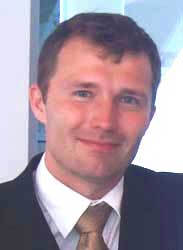Golkowski receives major NSF CAREER Award
Mark Golkowski, assistant professor of electrical engineering at the College of Engineering and Applied Science at CU Denver, has received a $456,000 National Science Foundation (NSF) Faculty Early Career Development (CAREER) Program Award.
This award will support Golkowski’s idea for using the popularity of smartphones to demystify engineering and science material known to intimidate students.
Golkowski’s CAREER award project, “Whistler Mode Wave Propagation, Amplification and Coupling,” is a five-year investigation of electromagnetic wave propagation in the near-Earth-space environment. The research involves ground-based observations of low-frequency waves in Alaska, special laboratory experiments performed at the Naval Research Laboratory in Washington, D.C., and theoretical simulations performed at CU Denver.
The space environment enveloping the Earth (the near-Earth-space environment) hosts a rich array of physical processes as well as billions of dollars of spacecraft assets. Golkowski sees the scientific discoveries of the CAREER project as significantly enhancing current understanding of magnetospheric physics, including the large-scale energy dynamics known as space weather. Space weather effects are a leading limitation to spacecraft lifetime and thus a significant economic burden. Furthermore, with the prevalence of interconnected electronics, ground-based electrical and communication systems are more vulnerable to detrimental space weather events than ever before.
Through his project, Golkowski will provide a diverse audience exposure to advanced research and use novel numerical tools to improve engineering and mathematics instruction. He was motivated by two well-documented deterrents to science and engineering career paths: 1) insufficient mathematical proficiency, and 2) a perceived lack of instruction in applicable “real-world” skills in college level curricula. Unfortunately, these impediments tend to be most prevalent for underrepresented minorities.
“Electromagnetic waves are a prime example of key engineering and science material that is notoriously challenging to potential students,” Golkowski said. “Through this project we will attempt to address these issues by leveraging the current popularity of mobile smartphones among students.”
Golkowski and his research assistants will work with CU Denver senior design instructors to develop a special smartphone application that allows students to make recordings of electromagnetic waves and also visualize key aspects of electromagnetic phenomena. This application will allow students to improve their understanding of math and science and to record and examine the low-frequency waves that are the primary topic of Golkowski’s research. Through this application, the project will provide a much-needed bridge between a dominant mobile culture and the underrepresented education and career paths necessary to create and sustain it.
Golkowski said that through new smartphone tools and outreach efforts, cutting-edge space science research will be made accessible to all thus enhancing scientific and technological understanding.


